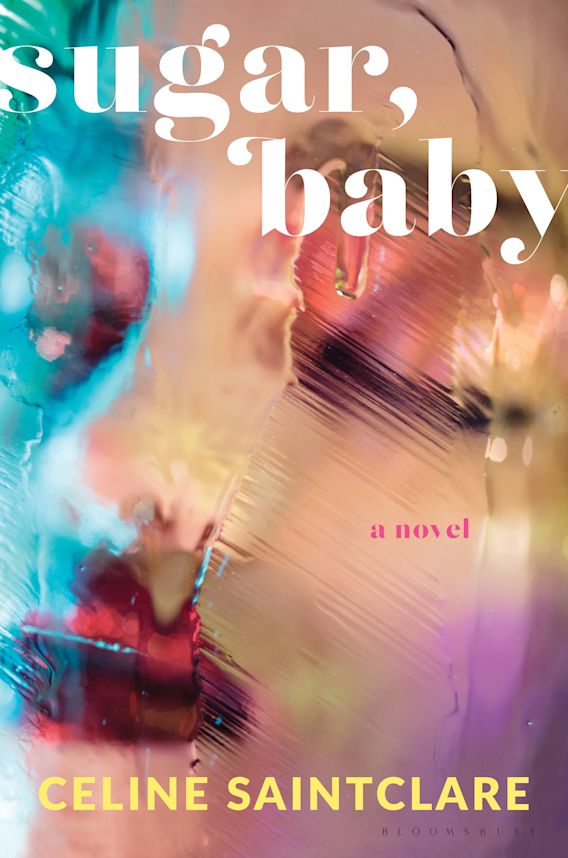 Celine Saintclare’s sultry and humorous debut novel, Sugar, Baby, is a journey through the superficially glamorous and inwardly twisted transformation of Agnes Green from ingenue to icon. Saintclare writes from Agnes’s point of view in present tense providing a very intimate view of what most of us think of as private moments. How private is anything with Instagram and an apartment full of other young women doing the same thing though?
Celine Saintclare’s sultry and humorous debut novel, Sugar, Baby, is a journey through the superficially glamorous and inwardly twisted transformation of Agnes Green from ingenue to icon. Saintclare writes from Agnes’s point of view in present tense providing a very intimate view of what most of us think of as private moments. How private is anything with Instagram and an apartment full of other young women doing the same thing though?
When one of her most glamorous cleaning service clients, Emily, approaches her, Agnes fears that this duster versus Gucci handbag standoff might be a result of her helping herself to random trinkets from Emily’s closet, but in fact Emily wants Agnes to be her “Test Bunny” for an ebook she’s writing on how to be irresistible to men.
Agnes goes from trial run as a sugar baby on the scene to full apprenticeship when her mother Constance kicks her out of the house for saying she was babysitting instead of going clubbing. Thus begins Agnes’s life in “Sugarland” (a flat in Kensignton) among the models.
Saintclare artfully captures the power dynamics between the flatmates. Emily is the queen bee and can’t stand Kiki who actually buys her high-end fashion from paychecks from modeling gigs or a tier of daddies that Emily will never reach.
Agnes rarely lets on to her flatmates and never to the men she dates that she wonders about how long she can compartmentalize this character she has developed and her real self. As sugarbabydollx09, she shares a vulnerable post after a bad trip to Paris with a sugar daddy, “How does a sugar baby survive? She cuts out the feeling part of herself and strangles it dead. She doesn’t expect to be comforted in a world that denigrates sensual women, so she must create her own comfort.” In this poignant moment, Agnes not only demonstrates strong self-awareness of the person she is becoming, but the idea of comfort here resonates throughout other experiences she has in Paris with this sugar daddy. Initially, she believes that if they are going to Paris, it must be romantic, but all the romance is superficial. She’s with a man who won’t even be seen in public with her if she isn’t wearing make-up, and when this clearly hurts her feelings, he accuses her of being petulant. Meanwhile, it’s clear that as a sugar baby, she’s expected to say flattering things to him, not raise any tough subjects, and give him massages. She is there, ultimately, for his comfort, but nobody is there for hers.
It’s easy to read through this spicy novel and just take in the fun and glamor, but Saintclare also captures the pain, highlighting the often overlooked or unseen emotional aftereffects as one of Agnes’s flatmates spends every morning after a night out “barricaded in her lilac bedcovers and crying.” Agnes must decide whether to choose herself and her passions or continue to be the object of others’ desires before her family fades away.
The lives of Agnes and her mother parallel each other. Here are two women pretending they don’t need each other, and that all they need is money, shelter, and work. But even during her fancy dinners, Agnes craves the simple dishes at home served on simple plates, and her sister describes Constance as sad and barely functioning since Agnes moved out. Agnes’s self-esteem plummets with every man who ends their arrangement over something silly like a simple ponytail instead of a coiffed ‘do. Her trust in men reaches new lows as it dawns on her that almost all the sugar daddies are married—if they’re not, they’re too crazy to even be sugar daddies.
Being a sugar baby holds out the promise of being an empowered and sensual woman. Play up your sexuality. Wear sexy clothes. Enjoy having whatever kind of sex you like with as many people as you like. Make changes when you’re unhappy, and make lots of money. In the end, though, the woman is still there to grant the daddy’s wishes. Even her pay is called “an allowance.” A sugar baby can be well paid and careless and free . . . as long as she remembers who and what she’s there for. This sends a powerful message about the bind we tend to put women in when it comes to sexuality and wanting nice things. We’re either sluts or prudes; gold diggers or goody two shoes. We can’t just be women. Even Constance quotes from the Bible about treating women like commodities, “A wife of noble character who can find? She is worth far more than rubies.” This seems to suggest something exists that might be more valuable. What about diamonds?
Editor and author Elizabeth Lyon often claims that emotion is the most difficult and most crucial thing to get on the page, and Celine Saintclare consistently reveals emotion through her characters’ actions. This is quite a feat since Agnes is an overthinker, but we see her develop and feel through her challenges by her actions—some public and others private. Saintclare’s mastery of creating a memorable and complicated character with Agnes Green makes her walk on the wild side both entertaining and touching.
Publisher: Bloomsbury Publishing
Publication Date: January 9, 2024
Reviewed by Amy Armstrong
